
Jack Delano Truck service station on U.S. 1, NY Avenue, Washington, DC 1940

“..a depressing decline in the highest office of the most powerful empire in the history of the world.”
• Pity the Sad Legacy of Barack Obama (Cornel West)
Eight years ago the world was on the brink of a grand celebration: the inauguration of a brilliant and charismatic black president of the United States of America. Today we are on the edge of an abyss: the installation of a mendacious and cathartic white president who will replace him. This is a depressing decline in the highest office of the most powerful empire in the history of the world. It could easily produce a pervasive cynicism and poisonous nihilism. Is there really any hope for truth and justice in this decadent time? Does America even have the capacity to be honest about itself and come to terms with its self-destructive addiction to money-worship and cowardly xenophobia?
Ralph Waldo Emerson and Herman Melville – the two great public intellectuals of 19th-century America – wrestled with similar questions and reached the same conclusion as Heraclitus: character is destiny (“sow a character and you reap a destiny”). The age of Barack Obama may have been our last chance to break from our neoliberal soulcraft. We are rooted in market-driven brands that shun integrity and profit-driven policies that trump public goods. Our “post-integrity” and “post-truth” world is suffocated by entertaining brands and money-making activities that have little or nothing to do with truth, integrity or the long-term survival of the planet. We are witnessing the postmodern version of the full-scale gangsterization of the world. The reign of Obama did not produce the nightmare of Donald Trump – but it did contribute to it. And those Obama cheerleaders who refused to make him accountable bear some responsibility.
A few of us begged and pleaded with Obama to break with the Wall Street priorities and bail out Main Street. But he followed the advice of his “smart” neoliberal advisers to bail out Wall Street. In March 2009, Obama met with Wall Street leaders. He proclaimed: I stand between you and the pitchforks. I am on your side and I will protect you, he promised them. And not one Wall Street criminal executive went to jail. We called for the accountability of US torturers of innocent Muslims and the transparency of US drone strikes killing innocent civilians. Obama’s administration told us no civilians had been killed. And then we were told a few had been killed. And then told maybe 65 or so had been killed. Yet when an American civilian, Warren Weinstein, was killed in 2015 there was an immediate press conference with deep apologies and financial compensation. And today we still don’t know how many have had their lives taken away.

Because the 9/11 commission was so successful?
• Democrats Seek 9/11-Style Commission To Investigate Russian Hacking (G.)
Democratic members of the US Congress called on Monday for the creation of an independent commission to investigate Russia’s attempts to intervene in the 2016 election, similar to the September 11 panel that investigated the 2001 attacks on the United States. Their “Protecting our Democracy Act” would create a 12-member, bipartisan independent panel to interview witnesses, obtain documents, issue subpoenas and receive public testimony to examine attempts by Moscow and any other entities to influence the election. The panel members would not be members of Congress. The legislation is one of many calls by lawmakers to look into Russian involvement in the contest, in which Republican Donald Trump defeated Democrat Hillary Clinton in the White House race, confounding opinion polls.
Republicans also kept control of the Senate and House of Representatives by larger-than-expected margins. US intelligence agencies on Friday released a report saying that President Vladimir Putin of Russia ordered an effort to help Trump’s electoral chances by discrediting Clinton. Russia has denied the hacking allegations. A Kremlin spokesman said on Monday they were “reminiscent of a witch-hunt”. “There is no question that Russia attacked us,” Senator Ben Cardin, the top Democrat on the Senate foreign relations committee, told a news conference. Versions of the bill were introduced in both the Senate and House. In the Senate it has 10 sponsors. In the House it is backed by every member of the Democratic caucus, said Representative Elijah Cummings, the top Democrat on the House oversight committee. However, no Republicans currently back the bill, so its prospects are dim, given Republican control of both houses of Congress.

And then after that commission is done investogating, they won’t tell anyone?
• State Dep.: Presenting Evidence Of Russian Hacking Would Be Irresponsible (ZH)
One recurring lament throughout the theatrically dramatic campaign involving reports and emotional appeals by US intelligence agencies such as the CIA (whose primary function is the creation of disinformation) to ordinary Americans, that Russia had “hacked the US presidential election” is that for all the bluster and “conviction”, there has been zero evidence. And, as it turns out, there won’t be any, because according to the US State Department, US intelligence agencies were right to not reveal evidence of their proof that Russia interfered in US elections, and comparisons with intelligence reports that Iraq had WMDs were not relevant in the current year.
Asked by RT’s Gayane Chichakyan if Friday’s public intelligence report should have contained any proof of Russian intervention, State Department spokesman John Kirby said that no one should be surprised that US intelligence agencies were keeping evidence secret in order to protect sources and methods. “Most American people understand that they have the responsibility to protect their sources and methods,” Kirby said, adding it would be “irresponsible” to do otherwise. Actually, with the Iraq WMD fiasco strill fresh in “American people’s” minds, it is irresponsible to think most Americans are still naive idiots who will believe whatever the “intelligence agencies” will tell them.
Alas, none of that has filtered through to the appropriate authorities, and Kirby said that it was “up to the agencies to decide which information they share with the public. We rely on them to make that determination for themselves.” And, in this case, it meant sharing no information at all. The assessment in Friday’s report was made “by all 17 intelligence communities. All of them came to the same basic conclusion: that Russia interfered in the US election,” Kirby said. “All of our intelligence communities came to the same basic conclusion, over and over again.” They just couldn’t prove it, instead hoping that by repeating the same statement over and over would be sufficient.

Get an alternative is place first, makes sense.
• Breakaway Senate Republicans Push to Delay Obamacare Repeal (BBG)
A breakaway group of five moderate Senate Republicans pushed Monday to delay a bill repealing Obamacare until March — potentially enough pressure to force the party’s leadership to comply. The step is the latest sign of some Republicans’ growing uneasiness about their leadership’s plan to repeal the law with no consensus on a replacement as part of an effort to deliver swiftly on one of President-elect Donald Trump’s top campaign promises. Senators Bob Corker of Tennessee, Rob Portman of Ohio, Susan Collins of Maine, Bill Cassidy of Louisiana and Lisa Murkowski of Alaska offered an amendment Monday to the budget resolution that would extend the target date for the committees to write an Obamacare repeal bill to March 3 from Jan. 27.
“As President-elect Trump has stated, repeal and replace should take place simultaneously, and this amendment will give the incoming administration more time to outline its priorities,” Corker said in a statement. “By extending the deadline for budget reconciliation instructions until March, Congress and the incoming administration will each have additional time to get the policy right.” With Democrats opposed to a straight repeal bill, Republicans can lose no more than one backer if they want to fast-track their approach before Trump takes office. Republican leaders in the Senate are hoping to adopt the budget resolution – which would allow an Obamacare repeal bill to pass with 50 votes and escape a Senate filibuster – early Thursday after a marathon session of amendment votes.

The power of the US pharmaceutical industry is scary.
• If Trump Tries To Lower Drug Prices, God Help Him: Top Medicare Official (MW)
President-elect Donald Trump said on the campaign trail that Medicare should negotiate for lower drug prices. “God help him,” Acting Centers for Medicare and Medicaid Administrator Andy Slavitt said at the JP Morgan Health Care Conference in San Francisco on Monday. “He’s not wrong, but you need a lot of … to coin a phrase that’s been used, a fair amount of stamina if you are going to deal with the pharmaceutical industry on this topic.” Drug-pricing talk has been in the air at the JP Morgan conference, with a new administration about to take office and adding tremendous regulatory uncertainty to this sector. Despite critical comments made during election season, the president-elect has largely been seen by pharmaceutical and biotechnology companies as a positive, deregulatory force for their industry.
But the issue, still very much in the public eye, may not be off the table. Trump vowed to “bring drug prices down” in December comments to Time. The U.S. pays far more than other countries for pharmaceutical drugs, and has for a long time. “If [Trump] has the stamina he will see two things… the American public is being taken advantage of. And secondly, we are funding the R&D for free riders across the world,” Slavitt said. “And I don’t think the president-elect… is going to take too well to that.” While other countries use government negotiations to bring down drug costs, the tactic is often seen as anathema to the American free-market system. But, “this is a topic that will eventually be dealt with,” Slavitt predicted. “It’s easier to deal with this in 2017 than it will be in 2021 or 2022, when it is crippling the finances of health care.”

Too many people are already invested in the opposite idea.
• Jeremy Corbyn: UK Can Be Better Off Out Of The EU (G.)
Jeremy Corbyn will use his first speech of 2017 to claim that Britain can be better off outside the EU and insist that the Labour party has no principled objection to ending the free movement of European workers in the UK. Setting out his party’s pitch on Brexit in the year that Theresa May will trigger article 50, the Labour leader will also reach for the language of leave campaigners by promising to deliver on a pledge to spend millions of pounds extra on the NHS every week. He will say Labour’s priority in EU negotiations will remain full access to the European single market, but that his party wants “managed migration” and to repatriate powers from Brussels that would allow governments to intervene in struggling industries such as steel.
Sources suggested that the economic demands were about tariff-free access to the single market, rather than membership that they argued did not exist. Corbyn’s speech and planned media appearances represent the first example of a new anti-establishment drive designed by strategists to emphasise and spread his image as a leftwing populist to a new set of voters. They hope the revamp will help overturn poor poll ratings across the country, particularly with a looming byelection in Copeland, Cumbria. Speaking in Peterborough, chosen because it is a marginal Tory seat that voted heavily in favour of Brexit, and which Labour is targeting, Corbyn will lay into May’s failure to reveal any Brexit planning, and say that Labour will not give the government a free pass in the negotiations.
After comparing the prime minister’s refusal to offer MPs a vote on the final Brexit deal to the behaviour of Henry VIII in a Guardian interview, Corbyn will say: “Not since the second world war has Britain’s ruling elite so recklessly put the country in such an exposed position without a plan.”

This should scare people.
• Britain’s Dangerous Post-Brexit Borrowing Binge (BBG)
For the U.K. economy, the good news is that following the Brexit vote, the sky hasn’t fallen as many predicted; on the contrary, it’s been a period of unexpected fair weather. The bad news is that the benign outlook is encouraging a surge in borrowing, leaving households vulnerable if the Bank of England decides to tighten monetary policy. Andy Haldane, the chief economist at the central bank, said last week that as far as the British consumer is concerned, “it’s almost as though the referendum had not taken place.” That, he says, helps explain why the central bank’s gloomy prognosis of what a vote to leave the European Union would do to the economy has thus far turned out to be wrong. The nation appears to have been in celebratory mood this Christmas.
Credit-card company Visa said on Monday that U.K. spending jumped 2.6% in December from a year earlier, led by a 7.3% jump in hotels, restaurants and bars. In the final three months of 2016, overall spending posted its strongest growth in two years, Visa said. Britons have been loading up on debt. At the start of 2000, households had debts about equivalent to their disposable income. The ratio surged in the following years, peaking at 160% in the first quarter of 2008. As the financial crisis took its toll, people scaled back on borrowing, and the ratio had dropped to about 137% by September 2015. But it then rose for four consecutive quarters, with the most recently available figures showing a jump to 143% in the third quarter of last year:
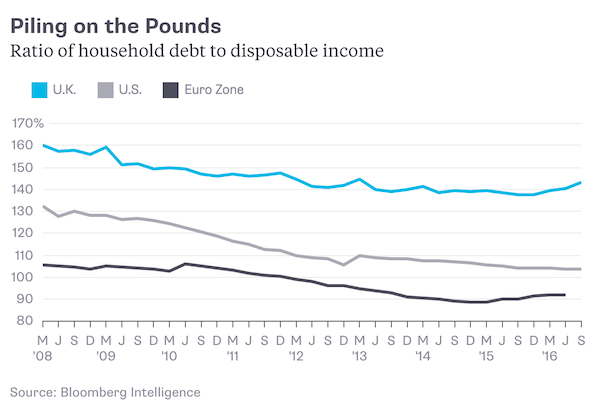
As the chart shows, Brits are more indebted than their peers in either the U.S. or the euro zone. Perhaps unsurprisingly, while British households are still making their payments on secured loans such as mortgages, defaults on unsecured loans surged as the total debt burden climbed:
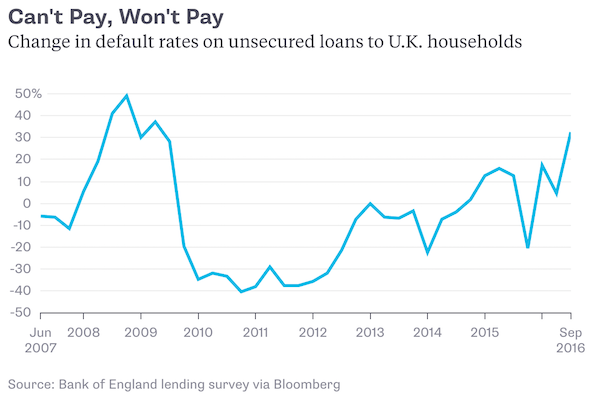

“Of late [..] liquidity in China has been a mere accounting artifact.”
• Shadow Lending Leaves Chinese Banks Looking Exposed (BBG)
In their obsession with China’s falling foreign-exchange reserves, investors may be ignoring a more painful Catch-22: a growing shortage of bank deposits. Left unaddressed, the lenders’ liquidity squeeze could leave them dangerously exposed to fickle wholesale financing, while trying to ease the shortage could worsen capital flight. Take Bank of Jinzhou. With just 0.3% of the $22 trillion in assets of the 35 publicly traded Chinese lenders, the bank appears remarkably liquid. Its 57% loan-to-deposit ratio in June was below the median reading of 67%. The Hong Kong-listed institution’s 200 billion yuan ($30 billion) deposit base offered ample support to a loan portfolio only a little higher than half that amount.
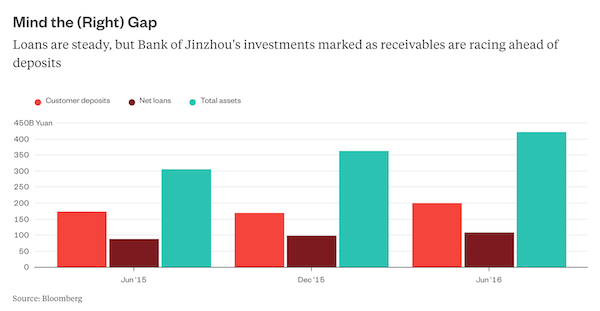
Of late, however, liquidity in China has been a mere accounting artifact. Customers’ deposits aren’t sufficient to finance Bank of Jinzhou’s 213 billion yuan in shadow loans, which are debt securities that the lender classifies as receivables. To make up the shortfall, it has borrowed 142 billion yuan from other financial institutions. Of this, as much as 78% is short-term financing. After adjusting for shadow lending, S&P Global Ratings pegged Bank of Jinzhou’s loan-to-deposit ratio at the end of 2015 at 153%. Bank of Jinzhou is hardly the only Chinese bank flirting with illiquidity: Almost all are sitting on a pile of debt masquerading as receivables.

Nobel Peace Prize.
• Thousands Of US Troops Arrive In Europe (ZH)
Just days after we reported that the US had begun deploying some 2,800 tanks, trucks and other military equipment to Germany, from where they would be transported by rail and road to Eastern Europe as part of a buildup of NATO reinforcements against “Russian expansion”, the next US deployment has made its way to Europe over the weekend, when some 4,000 US troops arrived in the German port of Bremerheven, on their way to Wroclaw, Poland under a planned NATO operation to “reassure the alliance’s Eastern European allies” in the face of what NATO has dubbed mounting Russian aggression. The American soldiers landed in Wroclaw, home to a key Nato and Polish air base in south-west Poland.
The troops will be followed by the roughly 2,800 tanks and other pieces of military equipment which are currently en route from Germany. The delivery of US Abrams tanks, Paladin artillery, and Bradley fighting vehicles, as well as supporting troops, marks a new phase of America’s continuous presence in Europe, which will now be based on a nine-month rotation. Why provoke Russia with yet another mass deployment? Because as NATO Major General Timothy McGuire told reporters, last week, when asked if the large deployment was meant to send a message to Russia, “The best way to maintain the peace is through preparation.” And while we are quoting, here is another good line from the movie Spice Like Us: “A weapon unused is a useless weapon.” The US military industrial complex is doing everything in its power to make sure a lot of weapons are used in the future.

The priesthood is aghast.
• Top Economists Grapple With Public Disdain (WSJ)
The nation’s leading economists are suffering an identity crisis as many of the institutions they helped build and causes they advanced have come in for public scorn and rejection at the ballot box. The angst was on display this weekend at the annual conference of the American Economic Association, the profession’s largest gathering. The conference is a showcase for agenda-setting research, a giant job fair for the nation’s most promising young economists and, this year, the site of endless discussion about how to rebuild trust in the discipline. Many academic economists have been champions of free trade and globalization, ideas under assault among rising populist movements in advanced economies around the world.
The rise of President-elect Donald Trump, with his fierce rhetoric against elites, in particular, left many at this conference questioning their place in the world. “The economic elite did many things to undermine their credibility while people’s economic fortunes were taking a turn for the worse,” said Steven Davis, an economist at the University of Chicago. But a road map for regaining trust is elusive. “I used to think facts and analysis will ultimately carry the day but now I’m not quite sure.” [..] Surveys from the Pew Research Center have documented dwindling support for free trade. In 2014, 60% of Democratic voters and 55% of Republican voters supported such trade agreements. In an October survey, however, support among Democrats had fallen to 56% and support among Republicans had nose-dived to 24%.
Over a billion people moved out of poverty in developing countries in the last 25 years, lifted in part by global trade and other economic prescriptions, but those same policies created winners and losers in the West. Another Pew study last year compared views of whether it was good for the U.S. to be so involved in the global economy: 86% of scholars said it was good, and just 2% bad. Among the general public, 49% thought it was bad, and just 44% good.
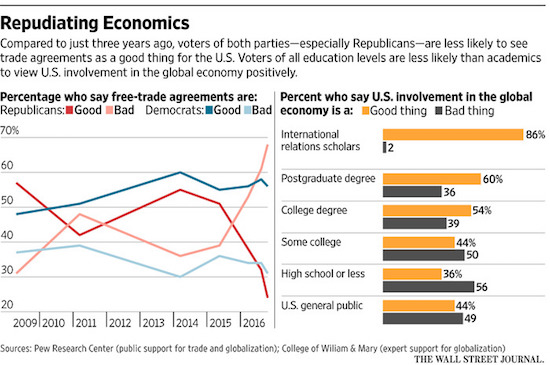

A lot of snow in Athens overnight. Very cold too. It’s worse on the islands. And all we get is blame games.
The refugees and migrants, thousands of people from Asia and Africa who are wintering in Greece in the hope that their dream will come true and that they will move on to central and northern Europe (imagined as hospitable by need) are harboring no illusions about this country. Greece is a country with real problems: economic, social and now weather-related. These people have to put up with the same problems as we do but the place where they are doing it from is far more difficult: They have no safe accommodation, no money and limited freedom. The additional shows of solidarity that may have come with the holiday season (even if mere publicity stunts designed for the television cameras) were soon to be wiped out by the cold snap, which also affected the islands of the Aegean. There will be no such thing as halcyon days for these people.
Official assurances by government officials that the authorities managed to provide warm and safe shelter for all asylum seekers and migrants offer little comfort, as no amount of political will, or plain desire for that matter, can reverse the situation on the ground. The problems faced by the refugee population are not tackled by prohibiting photographers from documenting the situation inside the Moria camp on Lesvos island. You cannot remedy reality by banning its representation. Is it that we do not want to taint the nation’s image in the eyes of our European partners? But the image of Greece is only part of the bigger European image. What is now happening at Moria, or any other migrant camp in Greece or Italy, is not disconnected from the values and priorities in the rest of Europe, in Poland, Austria, Slovakia or Denmark.
European Union countries, which had pledged to take in 160,000 people from Greece and Italy, have so far absorbed below 5% of that figure. Just 6,212 lucky few have been relocated from Greece and 1,950 from Italy, making a total of 8,162. The inaction, the indifference and the amoralistic policy of Europe (which is also fed by electoral concerns and growing far-right intolerance) should not serve as an alibi for the Greek government. In dealing with the migrant crisis, the SYRIZA-led administration has reacted without a clear plan or good coordination with other governments. And one last thing: The decision of Lesvos’s hoteliers to close their doors to refugees and migrants is barely in line with all the idealized rhetoric about a community’s obligations toward a supplicant – and it seems even more out of line under the existing circumstances.

The EU hands 10s of millions in taxpayer funds to NGOs. As these fail to do what they receive the money for, it’s back to blaming Greece.
• European Commission: ‘Untenable’ Situation In Greek Refugee Camps (AP)
The European Commission says conditions for refugees on Greek islands and in other camps where they are housed in tents despite severe cold weather, is “untenable.” Heavy snowfall has hit large swaths of Greece, including the eastern Aegean islands where thousands of refugees are stranded. Giorgos Kyritsis, spokesman for the government’s crisis committee on migration, told Greece’s Skai television that just under 1,000 people remain housed in tents on the islands. The severe weather had been forecast well in advance, and the government has come under fire for not acting fast enough to ensure all refugees are adequately housed. Commission spokeswoman Natasha Bertaud said the commission “is aware that the situation is currently untenable, but we also have to be clear” that conditions in reception centers are the responsibility of Greek authorities.
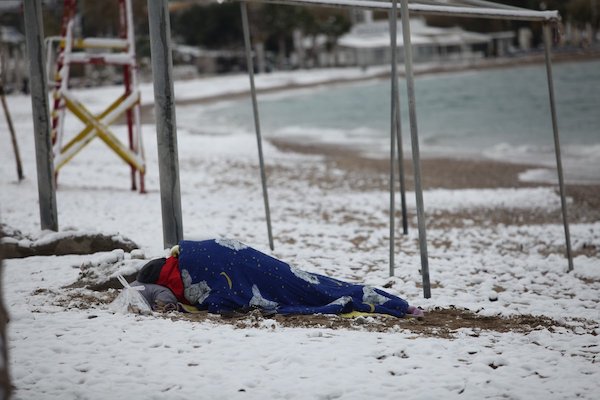
January 10 : homeless man sleeps on Athens beach Photo: Eurokinisi









Home › Forums › Debt Rattle January 10 2017